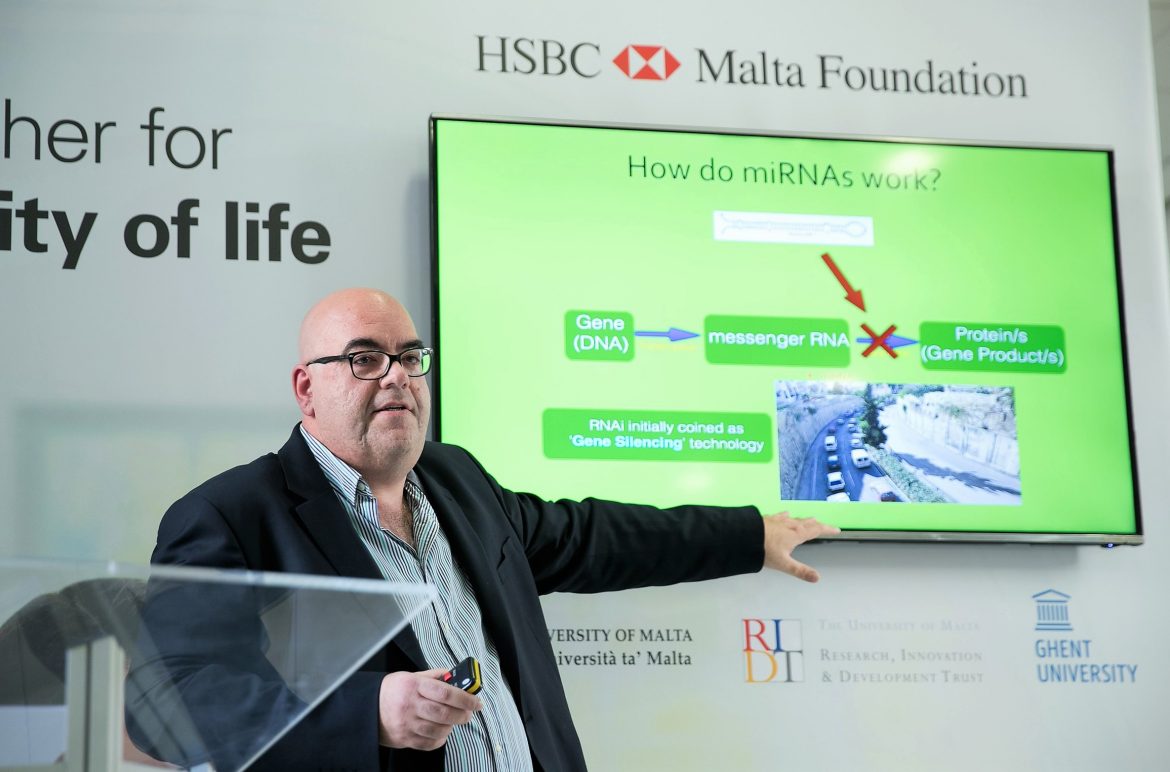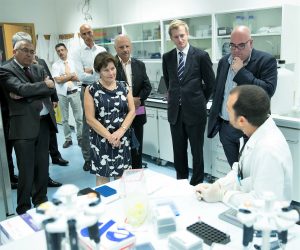
A novel research into chemotherapy currently underway at the University of Malta has received a fresh impetus thanks to a donation of €84,000 by the HSBC Malta Foundation via the Research, Innovation & Development Trust (RIDT).
The study is being led by an accomplished scientist in the field of micro-ribonucleic acid (miRNA), Dr Duncan Ayers, who is investigating ways to mitigate the often damaging side effects of chemotherapy on cancer patients by exploiting the potential of miRNAs. RNA is a vital molecule for living beings and it can in turn be controlled by miRNAs. Whilst at the University of Malta, Dr Ayers is credited with discovering a miRNA combination that affects specific cancer chemo-resistance.
If successful, the collaborative research holds the potential to become a precursor to pharmaceutical trials. The project is being orchestrated between the Centre for Molecular Medicine and Biobanking of the University of Malta and the Functional Cancer Genomics and Applied Bioinformatics Group at Ghent University, Belgium.
“Patients undergoing repeated cancer chemotherapy cycles often must endure high doses of chemotherapy drugs, with severe side effects. The cancer tumour might also develop resistance to such drug therapy, rendering chemotherapy cycles less effective and leading to increased doses administered to the cancer patient,” explained Dr Ayers. “The project proposes an additional step to the commonly employed chemotherapy treatment procedure, through the added use of novel miRNA antagonists that would force the cancer cells to be more receptive to chemotherapy.”
Preliminary results have shown that the new treatment methodology would benefit patients, particularly whose cancers have spread, in two ways; increasing the effect of chemotherapy dose positively, and achieving the same level of treatment with reduced dosage, in turn, reducing side effects in patients with poor tolerance to conventional chemotherapy drugs.
HSBC Malta CEO Andrew Beane said: “At HSBC, we want to support the passion of leading Maltese scientists to write the next chapter of innovation in medical and academic research. Their dedication in ground-breaking research continues to make a significant positive impact in the lives of patients, their families, and all members of society.”
 Thanking HSBC Malta Foundation on behalf of RIDT and the University, Rector Prof Alfred Vella said: “Despite the fact that we are a comparatively small university and we often work in larger networks and alliances, the University of Malta researchers are often at the forefront of pioneering innovation and technology. This study is another example of how our collaboration with a world top-100 university – University of Ghent – is advancing the fields of cancer research and therapeutics.”
Thanking HSBC Malta Foundation on behalf of RIDT and the University, Rector Prof Alfred Vella said: “Despite the fact that we are a comparatively small university and we often work in larger networks and alliances, the University of Malta researchers are often at the forefront of pioneering innovation and technology. This study is another example of how our collaboration with a world top-100 university – University of Ghent – is advancing the fields of cancer research and therapeutics.”
Dr Ayers’ counterpart at Ghent is Prof. Jo Vandesompele and who enjoys a longstanding track record of scientific achievements and publications in miRNA cancer research, particularly in the field of neuroblastoma, including a recent publication in the globally renowned scientific journal Nature. With this donation to the University of Malta, HSBC Malta Foundation has initiated support for medical research in addition to its longstanding involvement with education, the environment and heritage.
